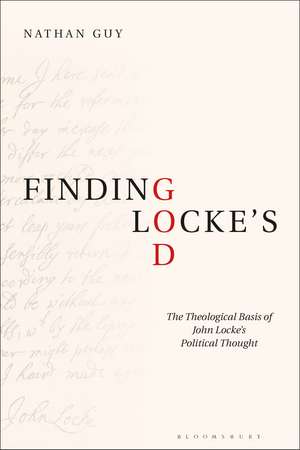Finding Locke’s God: The Theological Basis of John Locke’s Political Thought
Autor Prof Nathan Guyen Limba Engleză Paperback – 24 mar 2021
| Toate formatele și edițiile | Preț | Express |
|---|---|---|
| Paperback (1) | 218.09 lei 6-8 săpt. | |
| Bloomsbury Publishing – 24 mar 2021 | 218.09 lei 6-8 săpt. | |
| Hardback (1) | 657.22 lei 6-8 săpt. | |
| Bloomsbury Publishing – 18 sep 2019 | 657.22 lei 6-8 săpt. |
Preț: 218.09 lei
Nou
Puncte Express: 327
Preț estimativ în valută:
41.73€ • 43.69$ • 34.53£
41.73€ • 43.69$ • 34.53£
Carte tipărită la comandă
Livrare economică 08-22 aprilie
Preluare comenzi: 021 569.72.76
Specificații
ISBN-13: 9781350250055
ISBN-10: 1350250058
Pagini: 256
Dimensiuni: 156 x 234 mm
Greutate: 0.37 kg
Editura: Bloomsbury Publishing
Colecția Bloomsbury Academic
Locul publicării:London, United Kingdom
ISBN-10: 1350250058
Pagini: 256
Dimensiuni: 156 x 234 mm
Greutate: 0.37 kg
Editura: Bloomsbury Publishing
Colecția Bloomsbury Academic
Locul publicării:London, United Kingdom
Caracteristici
John Locke holds a special appeal to an American audience. Jefferson's "life, liberty, and the pursuit of happiness" is borrowed language from Locke, as are such notions as freedom, equality, and religious tolerance
Notă biografică
Nathan Guy is Adjunct Instructor in the School for Professional Studies at St. Louis University, and serves as Preaching Minister for the West Side Church of Christ in Searcy, Arkansas, USA. He holds a PhD from the University of Cambridge, an MPhil in Theology from the University of Oxford, and an MSc in Philosophy & Public Policy from the London School of Economics & Political Science, UK.
Cuprins
AcknowledgementsList of Abbreviations Introduction Part I:In Defense of the Religious Turn1. The New Perspective on Locke: The Religious (Re)Turn in Locke Scholarship2. Life in the Areopagus: Secular Echoes, Religious Refrain3. Locke and the Latitudinarians: Locke's Religious Experience and Theological Influences in the Context of Seventeenth-Century England Part II: From A "Religious" to a "Theological" Turn: Tracing Locke's Theological Argumentation4. The God of Christianity and the Foundations of Morality5. Natural Law, the Law of Nature and a Theology of Creation6. Revelation, Reason and Scripture Conclusion BibliographyIndex
Recenzii
This important book dispatches once and for all the notion that Locke was a deist. Placing Locke in historical context, Nathan Guy demonstrates how deeply Locke's theology, if at times heterodox, structured the whole of his political system. Locke emerges from this crisply argued study as a 'Christian political philosopher' with continuing lessons to teach about tolerance and faith.
Nathan Guy's Finding Locke's God breaks much-needed new ground in thinking carefully about the role of Christian theology in the origins of modern social order. Combining a deeply informed review of the scholarly literature with fresh and important questions about how Locke's argument relies on specific theological commitments, Guy invites scholarship on Locke's religion to move forward from the great question of the last generation - whether to place Locke within the Christian natural law tradition, even if his place there is an idiosyncratic one - to what promises to be the great question of the next generation: What specific theological commitments were essential for Locke, and how do they shape his political philosophy? This book makes an important contribution to our understanding of the perpetual crisis of religion and politics in the modern world, and anyone interested in that problem should read it.
In this concise, well-researched and carefully argued book Nathan Guy an authoritative path between the multitude of interpretations to clarify precisely what is the relationship between Locke's faith and his political theory. Few doubt Locke's personal religious beliefs but many disagree about what implication they have for his politics. Some argue that they destroy any credible case for deriving a liberal political philosophy from his thought; others argue that his liberal political philosophy either undermines those beliefs or exposes them as a sham. Guy sorts through these complex debates with authority and skill presenting an account of Locke as a Christian political philosopher whilst addressing all the important complications that go with this description. This book is an indispensable guide to political philosophers and theologians who are interested in Locke, liberalism and the place of Christianity in public debate.
Nathan Guy's Finding Locke's God breaks much-needed new ground in thinking carefully about the role of Christian theology in the origins of modern social order. Combining a deeply informed review of the scholarly literature with fresh and important questions about how Locke's argument relies on specific theological commitments, Guy invites scholarship on Locke's religion to move forward from the great question of the last generation - whether to place Locke within the Christian natural law tradition, even if his place there is an idiosyncratic one - to what promises to be the great question of the next generation: What specific theological commitments were essential for Locke, and how do they shape his political philosophy? This book makes an important contribution to our understanding of the perpetual crisis of religion and politics in the modern world, and anyone interested in that problem should read it.
In this concise, well-researched and carefully argued book Nathan Guy an authoritative path between the multitude of interpretations to clarify precisely what is the relationship between Locke's faith and his political theory. Few doubt Locke's personal religious beliefs but many disagree about what implication they have for his politics. Some argue that they destroy any credible case for deriving a liberal political philosophy from his thought; others argue that his liberal political philosophy either undermines those beliefs or exposes them as a sham. Guy sorts through these complex debates with authority and skill presenting an account of Locke as a Christian political philosopher whilst addressing all the important complications that go with this description. This book is an indispensable guide to political philosophers and theologians who are interested in Locke, liberalism and the place of Christianity in public debate.
